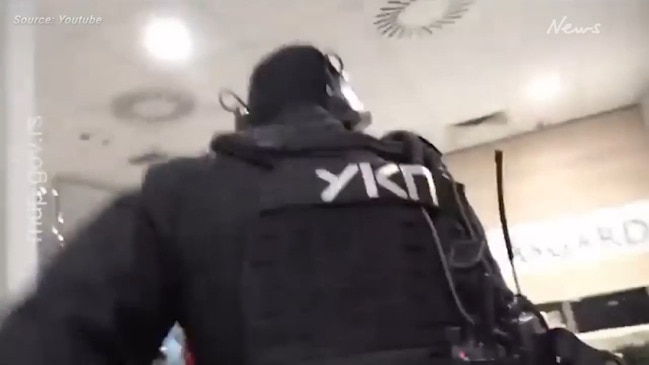Massive fraud syndicate dupes 30,000 Aussies out of millions
A single international fraud syndicate has fleeced more than 30,000 Australians out of hundreds of millions of dollars with the help of mass advertising campaigns on Facebook and other online platforms.

A single international fraud syndicate has duped more than 30,000 Australians out of hundreds of millions of dollars with the help of mass advertising campaigns on Facebook and other online platforms.
Federal authorities were handed a database of the syndicate’s tens of thousands of Australian victims last year, but there are doubts there have been serious attempts locally to investigate, a federal cybercrime inquiry has been told.
Worldwide losses are estimated to total more than $400m, with more than half from Australians, sources familiar with an international investigation into the Israeli syndicate have separately told The Australian.

Victims were recruited in part through fake celebrity endorsements of fraudulent cryptocurrency investment schemes on social media.
The Australian Securities & Investments Commission was provided the database of Australian victims by a European law enforcement agency, IFW Global fraud investigators say in a parliamentary inquiry submission, but there had been no known attempts from any domestic agency to contact named local victims, despite them being prime targets for further scams.
“Such an effort would have been noticed by IFW since it represents several dozen of the victims,” IFW senior investigator Mark Solomons says in the submission. “By contrast, the European agency, which identified a few thousand victims in its own jurisdiction, has made efforts to contact each of them to alert them and encourage them to file criminal complaints.”
The Australian understands the 30,000-plus Australian victims of the vast investment scam syndicate were identified in an investigation led by German police.
Heavily armed officers stormed four Serbian call centres and 11 residences in January last year as part of the investigation.
The co-ordinated day of action involved authorities from Bulgaria and Cyprus and resulted in the recovery of vast troves of data.
The Australian has learned German police told ASIC in March last year that their analysis had identified more than 60,000 victims globally, and more than half of these were from Australia.
It is understood a database of Australian victims was subsequently sent to ASIC containing enough detailed information to launch a full-scale investigation and to collaborate with domestic and international agencies.
Mr Solomons says “the European agency has since identified a further 9500 Australian victims of the same group”.
At least seven Australians have lost more than €1m ($1.66m) each, according to initial data analysis. One lost €3.3m euros.
ASIC, the Australian Federal Police and financial crimes watchdog Austrac replied to the submission’s criticism of the nation’s law enforcement response to scams, outlining their efforts and successes in combating cyber fraud. Referring to the database of Australian victims, ASIC said it “will not comment on the existence or otherwise” of the information.
Call centres were operating in Serbia, Cyprus, Bulgaria, Ukraine, Romania, Moldova, The Philippines and elsewhere with “dedicated teams on a shift pattern to coincide with the Australian time-zone,” Mr Solomons says in the submission.
“The same modus operandi is used to target victims in Canada, which vies for top spot with Australia as the Israeli scam syndicate’s most favoured target.
“These groups make heavy use of social media and social engineering to find, recruit and dupe victims.
“This includes mass advertising campaigns on Facebook and other platforms featuring fake celebrity endorsements of fraudulent crypto investment schemes, with campaigns tailored to each country’s audience.”

Tech giant Meta has been intensely criticised for failing to stop ads on its Facebook and Instagram platforms that hijack identities of Australian business, media and political figures to promote scam investments.
Mining billionaires Andrew Forrest and Gina Rinehart, entrepreneur Dick Smith, Treasurer Jim Chalmers and TV host Allison Langdon are among those to feature in “deep-fake” videos promoting fraudulent schemes.
Dr Forrest brought criminal charges against Meta over scam ads, and in February he labelled Mark Zuckerberg’s company “reprehensible” after the emergence of a new video on Facebook and Instagram.
Meta has said it constantly tackles scams through technology such as new machine learning techniques and specially trained reviewers, and encourages users to report suspicious activity using in-app tools and to report crimes to local law enforcement.
It’s understood some victims were cold-called because their details are on “lead lists” of people identified as susceptible to fraud.
Others were fed through by websites that purport to teach people how to be day traders, but which the scammers own and control.
Mr Solomons and IFW’s chairman Ken Gamble provided the submission to the federal parliamentary joint committee on law enforcement’s inquiry into the capability of agencies to respond to cybercrime.
Scam syndicates are operating at a “staggering” scale, sometimes involving thousands of employees, Mr Gamble states.
Deficiencies in law enforcement experience and resources had resulted in a loss of public confidence and “allowed catastrophic financial losses to victims across the country”.
IFW’s submission states that ASIC “has focused almost entirely on local offenders even though virtually every serious organised fraud syndicate committing offences in Australia under the Acts administered by ASIC is based offshore, and ASIC has in some instances known exactly who was behind them”.







To join the conversation, please log in. Don't have an account? Register
Join the conversation, you are commenting as Logout